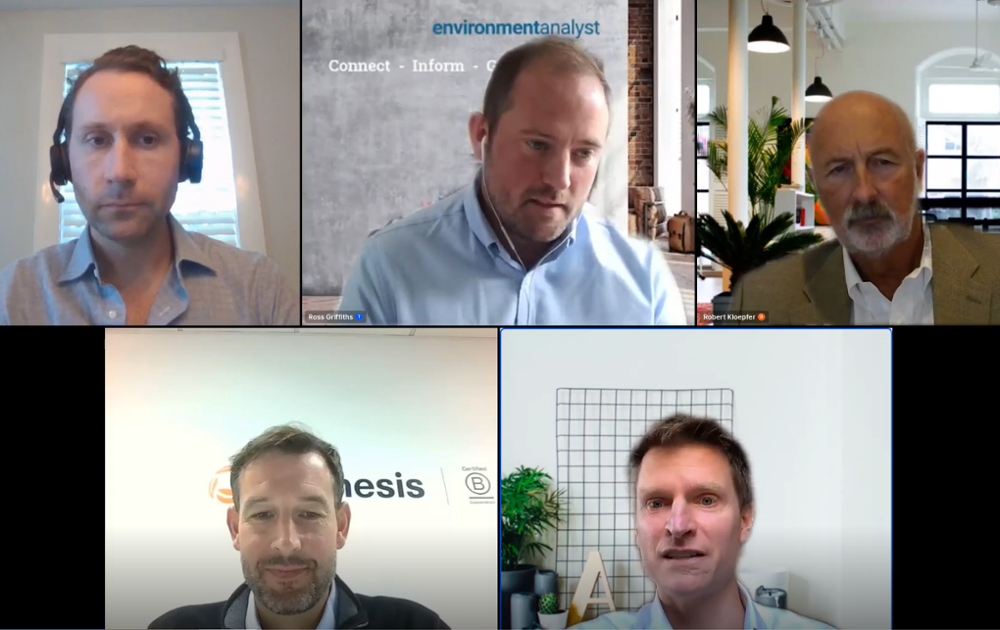
- PE has become increasingly prevalent, attracted by the strong industry fundamentals, growth trajectory and ESG impact potential.
- PE-backed E&S consultancies are outperforming the wider market, growing at double the industry average.
- Sector-specialist investors are building multi-company platforms with cross-fertilisation benefits.
- Downsides of the PE model include pressures relating to short ROI cycles, but alternative lower-risk options are available.
Growing private equity (PE) interests are influencing the expansion, ambitions and valuations — as well as climate action and ESG commitments — of key constituents within the environmental & sustainability (E&S) consulting industry. Here we explore the background and future implications of this trend, drawing on the conclusions of an Environment Analyst panel discussion (‘Impact of Mergers, Acquisitions & Financial Partnership Models in the Environmental & Sustainability Consulting Sector’).
PE partnership models have long been a feature of the E&S consulting space, going back more than two decades to when one of the sector founders, and major success stories, ERM, negotiated its first of several rounds of PE funding in support of a management buyout on the retirement of its original founding partners in 2001.
Of the 32 firms which constitute Environment Analyst’s Global E&S Consulting Market Assessment leaders, seven of them (~22%) have private equity or debt fund partners: Apex, Anthesis, ERM, Kleinfelder, TRC, RSK and SLR. Our proprietary industry data shows that collectively these firms have grown at twice the rate of the wider market in the five years from 2018 to 2022, having completed an incredible 85 M&A transactions between them in that timeframe.
ERM: the PE poster boy
ERM’s first PE partnership with 3i lasted four years, at which point Bridgepoint took over as a majority partner, followed by Charterhouse in 2011 in its third round of PE-supported refinancing deals. At that point, the company was valued at $950m — almost double its 2005 value and a multiple of 12x ERM’s then EBITDA. Next came OMERS and AIM Co in 2015 — by which time the business was valued at $1.7bn (15x EBITDA). The stakes ratcheted up a further notch in 2021 when KKR bought in as the primary shareholder (with ERM’s management team and partners continuing to hold a minority share), based on an equity valuation of $2.7bn — equivalent to an eye-watering 22.5x EBITDA.
Based on its most recent investment round, ERM has become the industry banner for achieving an ‘ESG premium’ in its company valuation — a feature EA has noted since the pandemic, whereby E&S consultancies have become extremely attractive to investors who are looking to boost their portfolio ESG impact credentials. This was a trend discussed by our recent M&A panel of industry business leaders and advisers.
Panellist Stephen Grant, director at boutique investment bank and knowledge economy M&A specialist Equiteq, confirmed that the ESG advisory market is very appealing to PE investors thanks to its high growth potential, "with its CAGR averaging 20% and a total addressable market 50x its current size of around $8.1bn". It is also because ESG is fast becoming an "integrated function of business, which isn’t hugely impacted by government policy," Grant added. The opportunity for PE’s favoured ‘buy-and-build’ model here is substantial because of the high degree of market fragmentation.
For London-headquartered ERM, its string of PE partnerships has certainly enabled the firm to globalise and scale its offering at pace. ERM has been one of the sector’s most acquisitive companies, bringing as many as 18 specialist E&S consulting firms into its portfolio in the last five years (from 2018 to 2022), to hone its capabilities focused on the low carbon economy transition. ERM employee numbers have doubled in the last decade to reach around 8,000 last year, with FY2022 revenues at $1.1bn, positioning the firm seventh overall in the global E&S consulting market — and making it the biggest PE-backed constituent in the sector.
Anthesis: PE route to global impact
Another sustainability pure-play looking to emulate ERM’s success is Anthesis. The latter has completed 21 separate acquisitions since its inception in 2013, growing to over 1,250 professionals based in 23 countries worldwide. Two years ago, Anthesis decided to work with sustainable growth specialist Palatine Private Equity, which took a minority stake in the business. At the time, Anthesis CEO Stuart McLachlan was keen to highlight that the partnership would help accelerate Anthesis’ efforts to achieve its bold ESG goal — to help its clients eliminate more than 3 gigatonnes of carbon dioxide equivalent by 2030 — equivalent to the UK’s entire national annual emissions.
A recent report from BCG underscores that the PE model tends to have a generally positive effect on company performance in terms of environmental and social sustainability indicators, driving the decarbonisation of large firms at a faster rate than for publicly traded peers.
According to Palatine’s senior investment director and panellist at the EA M&A webinar, Rupert Brown, Anthesis jumped out as an investment priority for its portfolio because of the "impact potential". Meanwhile, Anthesis M&A director Tim Craddock said that in Palatine, the company gained the "pace, scale and support to create a global footprint and get expertise into boardrooms with big clients," as well as a partner that could help identify interesting and aligned M&A targets.
"Our acquisitions are always focused on adding strategic services that will benefit our clients or adding in new geographies," Craddock qualified. For example, through Anthesis’ recent purchase of Wallbrook it was able to round out its governance offering within the ESG services ecosystem, as well as gain additional premises in London, Los Angeles, Hong Kong, New York, Singapore and Zurich.
Platforms and alternative options
Palatine has other E&S consulting providers within its portfolio in addition to Anthesis, including the UK-based Lucion Services (which itself had acquired Delta-Simons in 2021). And it is certainly not the only investor looking to build a platform of similar and/or complementary firms, with Blackstone another example, having recently acquired both Geosyntec and Sphera. There’s also Ares Capital Management, which entered into a partnership with SLR last year, less than twelve months after supporting the refinancing of RSK in what was the largest, private credit-backed sustainability-linked finance deal in history at that time, worth £1bn ($1.4bn).

Typically PE investments are made on a short-to-mid term basis of 3-6 years. The pressures imposed to make that cyclical return on investment (ROI) — and potential loss of full strategic control of the company — are downsides of the PE model. However, the RSK/Ares debt finance deal avoids some of the typical pitfalls. As RSK CEO Alan Ryder told Environment Analyst: "Ares has given us the financial backing to take the company forward, but without imposing a private equity mindset." In fact RSK is such a fan that is now seeking further private investment partners to help execute its ambitious SDG-aligned, global expansion plan to take the firm into the next decade.
---
This is the second of a three-part series. Part one can be found here.
View the panel discussion, 'Impact of Mergers, Acquisitions & Financial Partnership Models in the Environmental & Sustainability Consulting Sector,' on demand via this link.
